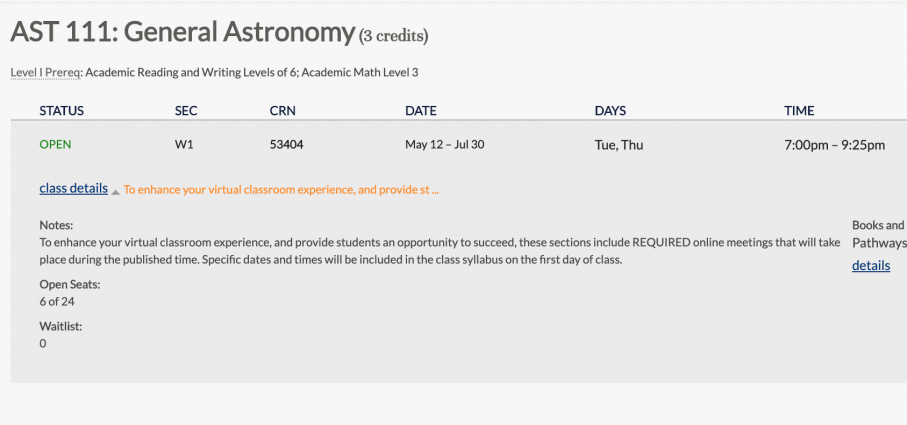
This summer, classes will be held entirely online at WCC due to COVID-19. Many classes, such as this general astronomy course, offer a “virtual classroom” option, which include live video lectures at specific scheduled times.
By Claire Convis
Deputy Editor
Class delivery methods at WCC continue to face adjustments due to the coronavirus pandemic. As the summer semester moves entirely online, the college reports some decrease in enrollment.
There are 1,160 new students enrolled in summer classes, compared to 1,456 this time last year, said Mika McAskill, vice president of strategic enrollment management at WCC.
“We’re down 20.33% in enrollment from last year, which isn’t bad considering there is a global pandemic,” McAskill said.
Enrollment for continuing students at WCC is down 23.07%, McAskill said. That means tuition and fees are down roughly 23% for the semester. Tuition and fees are the secondest biggest source of income to the college, after local property taxes.
Classrooms turn virtual for the summer
When the summer online curriculum was designed, it was done so with students in mind, said Kim Hurns, vice president of instruction. This summer, WCC is also offering “virtual classroom” courses in addition to traditional online classes.
“This was a response to what we believe students’ needs are,” Hurns said. “We wanted to try to maintain the richness of what we believe happens in classrooms.”
McAskill said that the virtual classroom option is “a great way to get your feet wet” when it comes to online learning, because you still see your instructor and classmates face-to-face and have more of a concrete schedule for the semester.
Completely online classes may seem overwhelming because “you kind of have to be your own boss,” McAskill said.
WCC has been offering courses online since 2005, and Hurns said that she believes already having an established presence online helped WCC make the transition to alternative learning back in March.
“We have the experience; we have the infrastructure and support,” said Hurns. “I think that really helped us get through this semester in a much more productive way.”
WCC was focused on creating quality online classes before the COVID-19 situation, and that gave the college a headstart in the transition online after schools shut down, said Linda Blakey, executive vice president of student and academic services.
“Washtenaw was kind of ahead of the game,” Blakey said.
For the virtual classroom courses offered for the summer, there will be class times and dates listed when students register for that course; during the times listed, at least 50% of that time will be used for instruction, Hurns said, including lectures, discussion rooms and study sessions.
“We were very deliberate,” Hurns said. “For some classes, you may not see a virtual classroom option because we thought that the other option made more sense.”
Students encouraged to try online classes
McAskill said that students have been reaching out to her with their questions about enrollment.
“We’re here. Get online, send an email, call, everyone is literally just waiting to help students,” said McAskill. “We’re still open; you can still keep knocking away at your dreams.
“We feel the hurdle that’s in front of us,” said McAskill. “We have to have enrollment to keep this thing going.”
Hurns said that once students get through the COVID-19 crisis, students won’t want to look back and see that something else they lost during the pandemic was their educational momentum and progress.
“Definitely stay on track with your goals,” said Hurns, who encouraged students to consider taking summer classes even if online classes aren’t their favorite. “Having that education makes a big difference.”
Blakey also said students should give online learning a try. She said there’s a self-assessment on the college website that students can take to get an idea if they are ready to take classes online.
Stepping up to a challenge
When it came to transitioning WCC classes from on campus to online in the midst of a pandemic, Hurns said that she is pleasantly amazed at how staff, students and faculty have responded.
“Our students, I think, have been extremely resilient, and a lot of them are on the frontlines, working at grocery stores, or they lost their jobs at restaurants,” said Hurns. “Many of our students are working at hospitals.”
Blakey shared Hurns’ sentiments.
“I’ve been really proud of our staff, as well our students, for stepping up to the challenge,” Blakey said.
Many instructors have risen to the task of adapting to alternative teaching methods, Hurns said.
“Every day I am just more in awe at some of the things that I’m hearing that instructors have done,” said Hurns. Along with instructors managing their newly online courses, they have also been assisting each other with the transition. Instructors have continued to have faculty meetings and check-ins, as well as figuring out how to best help their students learn from a distance.
“I think that tons of the faculty have learned ways to reach their learning objectives in different ways,” said Hurns. “Sometimes, in richer ways.”
For example, since online lectures can be recorded, students can watch a problem being solved or an experiment’s result over and over again.
“It’s challenging, but we are always trying to figure out how we can best respond to our student needs,” said Blakey. “It’s kind of like building the plane as we are flying it.”

